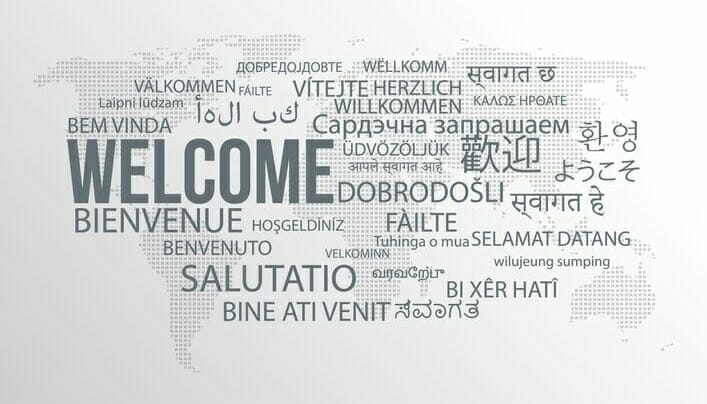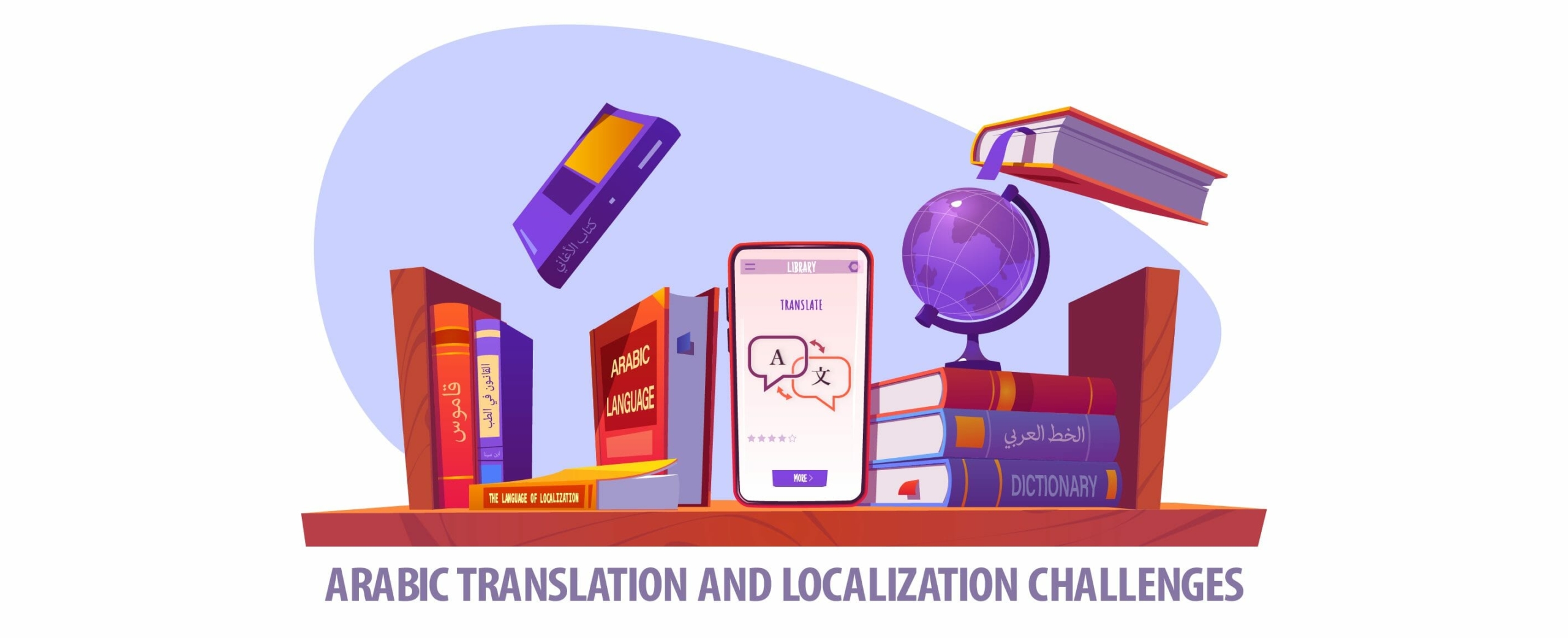Arabic Translation and Localization Challenges: An In-Depth Look
Translation
Translation is defined as the process of transferring speech from one language of origin to another language, with the need to maintain the transmission of speech in a way that preserves the meaning. Moreover, each translator has a style of his/her own, but he/she is required to stay away from literal translation.
Localization
Localization (or, in the context of the Arabic language, Arabization) is defined as introducing a set of foreign words into Arabic and using them in a way that suits the characteristics of Arabic. Most of these words are related to inventions, industries, and sciences, and if there is an equivalent in Arabic, it is not necessary to localize them.
Problems with Arabic localization
The localization process in Arabic faces several problems, the most prominent of which are:
The problem of books: The Arabic language lacks the presence of scientific references, as Arabic scientific books are few in number compared to the translated and foreign ones.
The problem of terminologies: The unification of terminology among Arab countries is difficult, despite the efforts of universities and the Union of Arab institutes to unify them.
The social problem: This is considered one of the most pressing problems faced by students when they graduate, especially from professional scientific colleges, due to the difference between the language of education and the language of society.
In the remainder of this article, there is a more in-depth discussion about the aforementioned problems.

Major challenges in the Arabic translation and localization scene
Translation and localization in the Arab countries have stagnated in recent years, and while the West translates tens of thousands of titles annually, Arab countries collectively only translate about 3,000 books. Specialists agree that Arabic translation is a real space for cultural exchange, and dialogue of civilizations, and plays a major role in building bridges between peoples. Voices have come out in the Arab literary and cultural arenas to demand the realization of an Arab strategic vision for the advancement of the publishing and translation industries.
There has been a need to transfer Arabic literature to foreign languages because of its cultural content, especially in the current situation, where the image of Arabs and Muslims and their civilization in the West have been linked to, at worst, radical ideologies and terrorism. So what is the reason for the stagnation of the translation movement in the Arab world, and what is the role of the conditions in Arab countries in this decline?
The subject of translation in the Arab world remains problematic, in terms of the absence of a strategy for what can be translated into in an institutional form, and of the concerted efforts to transfer what should be localized from the world’s languages. When it comes to major projects, there is a need for translation to include areas of extreme importance, not only literature. There should also be an awareness towards translation into languages other than English or French, about the lack of recognition and opportunity for Arabic translators, and piracy, which remains a minor but long-standing problem in the Gulf.
Likewise, there are the problems that affect the core of translation and the process of localization in Arabic, such as the failure to adjust or standardize many terms and concepts. Additionally, one should not forget the serious mistakes that translators commit when translating from other languages to Arabic, and the resulting confusing text that contributes to the creation of a confused and inaccurate perception of the Middle East.
An important issue to be taken into account is the recognition by Arabs of the importance of translation and or localization in the advancement and development of Arab knowledge, at the level of philosophy, literature, and other sciences.
Successive and accelerating transformations in all kinds of media require Arabs to be ready, adapting and understanding the phenomenon of modernity in its broad sense without affecting their national identity and cultural peculiarities to move forward.
Arabic translation and localization in the education field
Localization or Arabization and standardization of terms are the most important Arab issues in the field of education. Syria remains a leader in this field; it began to Arabize or localize from the moment the Syrian University was founded. Dr. Ihsan Al-Nass, Syria, Vice President of the Arabic Language Complex in Damascus, spoke about the excellence of the Syrian Arab experience in the field of localization and the role of the Arabic Language Complex in the field: “We started localizing since the establishment of the University in Syria in 1919, before anyone else. It was a complete success in that we had foreign medical resources and literature in Arabic. Later, the Complex set out its localization works and issued brochures on the problems of localization in the Arab world.” It is worth mentioning that Syria is considered the only country in the world that has been teaching Medicine in Arabic since 1920.

Factors contributing to the arising challenges
The most important factors contributing to the dominance of English over the Arabic language in the Arab world can be summarized as follows:
- The spread of international schools, language schools, and experimental schools, in various Arab countries, where lessons are taught in English
- English being taught in the faculties of medicine, pharmacy, engineering, computers, and natural sciences, in various Arab countries; creation of new programs in business schools and economy and political science fields in some Arab universities, and having courses in these colleges taught in English
- The predominance of the English language in public, whether on the streets or in the shops. Most ads and products are written in English, e.g. 90% of the most famous street commercials in the city of Assiut, Egypt is written in English.
- In light of the decline in the localization movement in the Arab world in the modern era, English predominates the Internet, computers, and communication technology, all of which are the biggest sources of information in all fields
- The use of English in some television channels and other media in many Arab countries
The predominance of the English language in different levels of education in different countries of the Arab world, unfortunately, incapacitates the local language and hampers its opportunity to flourish. Moreover, the lack of localization initiatives deprives some communities of information that could further progress.

Arabic translation and localization in the context of business
Localization in Qatar in 2017:
Experts, businessmen, citizens, and residents value the importance of Qatar’s Ministry of Economy’s decision requiring suppliers and merchants to localize invoices, service lists, goods data, and reception and communication services. They said the decision would also help provide employment opportunities for young Arab men and women who can provide Arabic business translation services with ease.
Given the resolution, some 7,708 registered companies prepared to begin taking the necessary measures to implement the decision. On the other hand, there are some 265 foreign companies licensed to establish branches in the country, the majority of whom deal in non-Arabic languages.
Providing at least one official who speaks Arabic at the reception sites of these companies, whether in public or private enterprises, is a good step. It is worthy to point out that local businesses with no proficiency in languages other than Arabic experience a lack of good communication when receiving service requests or orders, and issuing invoices and other official documents.
The circular comes within the framework of supporting not only the Arabic language but also the national economy and consumer protection, emphasizing the importance of invariably understanding all economic data and minimizing risks brought about by foreign language misunderstanding or poor Arabic translation efforts. The next step is going to include the localization of many corporate websites that exist only in English.
Despite the many challenges, the translation and localization field is experiencing, overcoming these presents many opportunities not only for Arab countries but also for foreign businesses aspiring to reach the market. In one of our previous articles, we talked about the importance of the Arabic language in the context of business and the global market. Localizing content into Arabic benefits the local community while greatly increasing the chances of success of foreign organizations.

Professional Arabic translation and localization agency
With over 10 years of experience, we, at CCCI International, are proud to offer professional translation and localization for games, comics, digital content, books, and manuals, as well as multilingual BPO and customer support services. Thanks to our specialists’ extensive expertise in multilingual translation fields, we successfully overcome both technical and creative translation challenges.
At CCCI, as a professional localization and translation agency, our localization process has three main stages. Firstly, we check all information provided by our clients such as the scope of the work, the jargon and styles necessary, and the format to be followed. Secondly, after checking the project files, we start the translation and localization process. Thirdly, our native proofreaders and quality checkers ensure that the project is subjected to detailed quality control.






